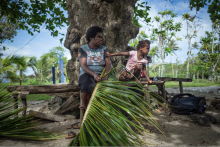Climate Injustice

By Ann Esswein, May 16, 2020
Almost 16,000 kilometers away from Port Vila lies the Old Land, as one region in the north of Germany is called. One would have to cross about 20 countries to get there. Basically, half way around the world. By plane, it would take two days. Then you’d be standing on Claus Blohm’s farm. Claus is a farmer with a firm handshake, his jacket tight. He walks through his apple orchard, which is so long that you cannot see the end. His shoes are already wet from the rain.
The Old Land is also called that way, because apples have always been grown here. Claus’ ancestors lived off of their apple trees, since the weather seems to have changed. Last summer, Claus says, it was hotter than ever before in Germany. 40 degrees. His apples got a kind of sunburn. First they turn completely pale, then brown. He lost almost 70 percent of his harvest that way. Fruit farmer Claus is desperate. He may have to give up his farm that we wanted to hand over to his children.
At about the same time, on the other side of the world, Salome Kalo is likewise worried. In her village Piliura, located on Pele Island, she is in charge of food security. Differently, than in Germany, where vegetables have to be imported in from distant countries and are piled up in supermarkets, everything grows in her garden: legumes, fruits, root vegetables. At least that’s the way it has always been, says Salome Kalo while walking on a little trail to her garden. Since Pam raged over Vanuatu, she also knows how it feels when you’re no longer sure you have food to eat. No leaves and no fruit were left when the cyclone destroyed almost the entire harvest five years ago. Ever since the storms have been getting stronger, the inhabitants of Pele Island have no longer planted their crops on the mountains, Salome explains, but need to plant it in the more secure backyards of their houses. But the storms are not her only worry. Although it is January, in the middle of the rainy season, not a drop has fallen from the sky for days, Salome witnesses. The plants suffer from the lack of water. “The weather is changing,” she says.
Almost 16,000 kilometers away from Port Vila lies the Old Land, as one region in the north of Germany is called. One would have to cross about 20 countries to get there. Basically, half way around the world. By plane, it would take two days. Then you’d be standing on Claus Blohm’s farm. Claus is a farmer with a firm handshake, his jacket tight. He walks through his apple orchard, which is so long that you cannot see the end. His shoes are already wet from the rain.
The Old Land is also called that way, because apples have always been grown here. Claus’ ancestors lived off of their apple trees, since the weather seems to have changed. Last summer, Claus says, it was hotter than ever before in Germany. 40 degrees. His apples got a kind of sunburn. First they turn completely pale, then brown. He lost almost 70 percent of his harvest that way. Fruit farmer Claus is desperate. He may have to give up his farm that we wanted to hand over to his children.
At about the same time, on the other side of the world, Salome Kalo is likewise worried. In her village Piliura, located on Pele Island, she is in charge of food security. Differently, than in Germany, where vegetables have to be imported in from distant countries and are piled up in supermarkets, everything grows in her garden: legumes, fruits, root vegetables. At least that’s the way it has always been, says Salome Kalo while walking on a little trail to her garden. Since Pam raged over Vanuatu, she also knows how it feels when you’re no longer sure you have food to eat. No leaves and no fruit were left when the cyclone destroyed almost the entire harvest five years ago. Ever since the storms have been getting stronger, the inhabitants of Pele Island have no longer planted their crops on the mountains, Salome explains, but need to plant it in the more secure backyards of their houses. But the storms are not her only worry. Although it is January, in the middle of the rainy season, not a drop has fallen from the sky for days, Salome witnesses. The plants suffer from the lack of water. “The weather is changing,” she says.
